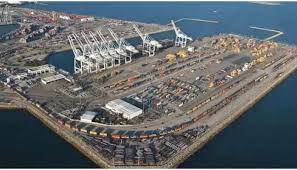
India looks beyond Chabahar to boost global port presence
NEW DELHI : India is eyeing a strategic expansion of its port infrastructure and management capacities on a global scale. Post its fruitful engagement at Chabahar Port in Iran, and other ports in its immediate neighbourhood, the country is scouting for opportunities in African nations for port and/or berth operations.
According to officials of the Ministry of Ports, Shipping and Waterways, these expansion efforts will be undertaken through Indian Ports Global Ltd (IPGL), a joint venture company formed by Jawaharlal Nehru Port Trust and Kandla Port Trust for the development of port projects overseas.
The shipping ministry has assigned IPGL the task of equipping and operating container/ multi-purpose terminals at Chabahar port and the company is reportedly looking for a project manager to be “stationed in Tehran”.
Starting with Tanzania, a few African nations have been shortlisted for exploring berth management opportunities.
Tapping Tanzania
Sources said that India and Tanzania have signed multiple memorandums of understanding (MoUs) related to maritime and port infrastructure development, including industrial parks, port operations, and maritime cooperation.
A key agreement is between Jawaharlal Nehru Port Authority (JNPA) and the Tanzania Investment Centre, for establishing an industrial park in Tanzania. Cochin Shipyard Ltd and Marine Services Co Ltd — a Tanzanian company operating ferries, cargo ships and tankers — have signed an MoU for cooperation in the maritime industry.
“Tanzania is definitely on the radar, and with JNPA constructing an industrial park or SEZ in that country, we will look at expanding our scope of operations there,” the ministry official, who declined to be named, told.
Tanzania’s main ports are in Dar es Salaam, Mtwara, and Tanga, all located on the Indian Ocean. Minor ports include Lindi, Kilwa Masoko, Mafia Island, Bagamoyo, Pangani, and Kwale. Additionally, there are ports on the Zanzibar and Pemba islands, including Chake Chake and Mkoani.
India’s largest integrated transport utility, Adani Ports and Special Economic Zone Ltd (APSEZ), currently has a significant presence in Tanzania, especially at Dar es Salaam port, where it manages container terminal No. 2 under a 30-year concession. Adani Ports also has a joint venture — named East Africa Gateway Limited — with AD Ports Group and East Harbour Terminals Limited, which acquired a 95 per cent stake in Tanzania International Container Terminal Services.
The Chabahar push
India, through IPGL, operates the Shahid Beheshti terminal at Chabahar Port, a strategic gateway for trade with Afghanistan and Central Asia, and vital to India’s participation in the International North-South Transport Corridor.
Container handling at Chabahar is expected to reach 100,000 TEUs (full capacity) by FY26 and plans are afoot for Indian shipping liners to launch operations there.
In FY25, the port’s container traffic is expected to reach 75,000 TEUs. By end-January, it had touched 64,245 TEUs, compared with just 9,126 TEUs in FY23, India’s shipping ministry data shows.
Chabahar port remains in an “investment mode”, a source said, with an added focus on marketing activities to ensure operational viability.
“Operations are commercially viable, but it will take some more time to be profitable, as geopolitical turmoil continues,” the source added.
A second berth is being planned too.
India is reportedly exploring ₹4,000-crore capex-led expansion of operations at Chabahar port. With orders for nearly five mobile harbour cranes, India eyes a five-fold capacity expansion to 500,000 TEUs over a 10-year period, shipping ministry officials said, adding that talks were underway.
Neighbourhood plans
Vying with China for a presence at ports in its immediate neighbourhood, India seeks to promote its strategic and commercial interests along trade routes between the Asia-Pacific region, Europe and Africa.
In Myanmar, IPGL has assumed control of operations at Sittwe port, which is an integral component of the Kaladan multimodal transit project linking Bangladesh, Thailand, and Kolkata.
The enhanced connectivity through Myanmar is expected to help India establish a seamless trade corridor to Southeast Asia and strengthen regional economic partnerships.
In Sri Lanka, the development and operation of Kankesanthurai port by IPGL not only boosts bilateral trade but also revives maritime passenger connectivity, with a regular ferry service planned between Nagapattinam (India) and Kankesanthurai (Sri Lanka).
APSEZ has announced the commencement of operations at the Colombo West International Terminal in Colombo port.
The $800-million, fully automated deepwater terminal can handle 3.2 million TEUs annually, elevating the port’s status as a key transshipment hub in South Asia.
Repositioning IPGL
Interestingly, India’s shipping ministry plans to propel IPGL into the commercial spotlight.
The State-run firm — currently limited to strategic outposts like Chabahar and Sittwe — is likely to be positioned as a domestic terminal operator, too, with high-value oil handling facilities.
At the centre of these plans is Bharat Global Ports, a newly formed State-owned consortium that is being pitched as an “end-to-end port infrastructure solutions provider”, including terminal operations, financing, logistics, and connectivity. IPGL will be the operations arm of this entity.
“If IPGL gets into domestic berth operations, it will improve the international image of the entity,” an official explained, as queries arise as to why a State-backed entity does not have presence in its own country.

